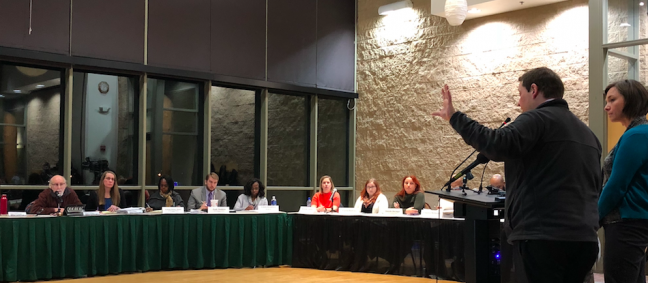City officials gathered Tuesday night to discuss a plan for the “Lost Cause” Confederate monuments located in Forest Hill Cemetery.
The cemetery, which is the northernmost Confederate cemetery in the U.S., contains 140 headstones and one confederate monument.
Meeting participants included Board of Park Commissioners President David Wallner, Landmarks Commission Chairman Stu Levitan and Equal Opportunities Commission Secretary Corinda Rainey-Morre.
The deciding committee held the joint meeting to hear the public’s concerns. Madison Mayor Paul Soglin opened the meeting, after which City Parks Park Operations Manager Lisa Laschinger and Park Superintendent Erick Nepp gave a presentation.
The committees suggested a few options, namely taking down and removing both Lost Cause monuments, leaving both monuments in place and altering the contained messages, or leaving one or both monuments in place and erecting a separate monument explaining the false narrative of the Lost Cause and the role of the monuments.
Soglin focused on the history of the monuments and his solution.
“The larger monument, I believe should stay,” Soglin said. “I believe it will be just and fair to the women and daughters of the Confederacy to place a monument next to it, which details this portion of American history. So that it becomes a living monument in itself to the lives and the betrayal.”
The meeting was then turned to Laschinger and Nepp who provided historical information on the monuments in the Forest Hills Cemetery.
Laschinger said the Confederate rest was created in 1862. The daughters of the Confederacy gifted the larger monument in 1906. The smaller monument, which was removed last August, was placed in 1981.
Members of the public were then able to voice their concerns about the monuments to the panel.
While some citizens did not support the removal of either monument and believed doing so would result in rewriting history, many citizens were in support of an additional memorial to provide information on the false narrative of the previous ones.
Madison resident Daniel Einstein provided some historical context on Madison in the Civil War and gave his opinion on the matter.
“We can certainly commemorate the Civil War, but let’s not celebrate the activities of the men who choose to take out arms against the federal government to support slavery,” Einstein said.
Einstein and other citizens suggested a community-wide discussion of the past events in Madison and of the Civil War.
The decision was moved to its respective committees for consideration. A final decision will be made after.


